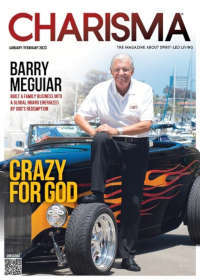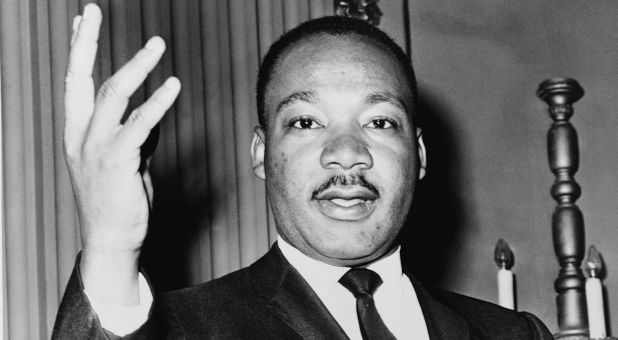Why Dr. Martin Luther King Jr. Called America’s Founding ‘A Sacred Heritage’
Read Time: 3 Minutes 14 Seconds
Writing in 1963 from the Birmingham city jail where he had been incarcerated, Dr. Martin Luther King, Jr. expressed his conviction that his fight for civil rights would succeed because of America’s unique heritage. He wrote,
“Our destiny is tied up with the destiny of America . . . We will win our freedom because the ‘sacred heritage’ of our nation and the eternal will of God are embodied in our echoing demands.”
Calling the country’s heritage “sacred” indicated that Dr. King believed there was something special and of God in America’s founding. He obviously considered the Jim Crow South where he lived and worked to be a sharp departure from America’s founding vision.
Frederick Douglass (1816-1895), the former slave and passionate abolitionist, came to the same conclusion 100 years before Dr. King. In his early years, he felt he had no part in America; but after years of research he completely changed his thinking. In a July 4th speech in 1852, Douglass called the U.S. Constitution “a glorious liberty document,” and declared,
“I am not wanting in respect for the fathers of this republic. The signers of the Declaration of Independence were brave men. They were great men too—great enough to give fame to a great age. It does not often happen to a nation to raise, at one time, such a number of truly great men.”
Douglass called the founders “brave men” because they took a bold stand against slavery at a time it was accepted and practiced in most of the world. The eminent Black scholar, Dr. Thomas Sowell, has said,
“Slavery was just not an issue, not even among intellectuals, much less among political leaders, until the 18th century–and then it was an issue only in Western civilization. Among those who turned against slavery in the 18th century were George Washington, Thomas Jefferson, Patrick Henry and other American leaders. You could research all of 18th century Africa or Asia or the Middle East without finding any comparable rejection of slavery there” (Hyatt, “1726: The Year that Defined America,” 90).
History shows that it was the Great Awakening (1726-1770) in Colonial America that shattered racial and cultural barriers and unleashed anti-slavery outrage throughout the Colonies (see Hyatt, “1726: The Year that Defined America,” 89). This Christian Awakening resulted in virtually every founding father, even those who owned slaves, taking a public stand against it.
By the time of the writing of the Declaration of Independence in 1776 and the Constitution in 1787, virtually every founder, including George Washington, agreed with John Adams, America’s 2nd president, who declared,
“Every measure of prudence ought to be assumed for the eventual total extirpation of slavery from the United States. I have throughout my whole life held the practice of slavery in abhorrence” (Hyatt, “Abolitionist Founding Fathers,” 36).
As a result, America’s founders formulated founding documents that contain no classifications based on race or skin color. The words “slave” and “slavery” are nowhere to be found. Instead, the Constitution speaks of “citizens,” “persons” and “other persons.”
Indeed, America’s founding generation understood America’s founding documents to be anti-slavery documents, guaranteeing liberty and justice for all. Abolitionists often quoted from both the Declaration and the Constitution in their fight against slavery (Hyatt, “Abolitionist Founding Fathers,” 54-55).
America’s Founders believed they had set the nation on a course for the soon elimination of slavery at a time it was practiced throughout the world. They did not, however, anticipate the invention of the cotton gin in 1798 nor how succeeding generations would backtrack on their vision of Liberty for all.
 Abraham Lincoln understood this and insisted that his fight against slavery was a continuation of the fight begun by America’s founders. He said,
Abraham Lincoln understood this and insisted that his fight against slavery was a continuation of the fight begun by America’s founders. He said,
“In the way our Fathers originally left the slavery question, the institution was in the course of ultimate extinction . . . All I have asked or desired is that it should be placed back again upon the bases that the Fathers of our government originally placed it upon” (Hyatt, “Abolitionist Founding Fathers,” 59-60).
Dr. King understood America’s true origins, which is why he could speak of the nation’s “sacred heritage.” This generation must rediscover and reconnect with this “sacred heritage” if the America of Washington, Douglass, Lincoln and King is to survive. {eoa}
This article is derived from Dr. Eddie Hyatt’s books, 1726: The Year that Defined America and Abolitionist Founding Fathers, available from Amazon and his website at www.eddiehyatt.com.
Bring Charisma magazine home with a subscription today!
















































